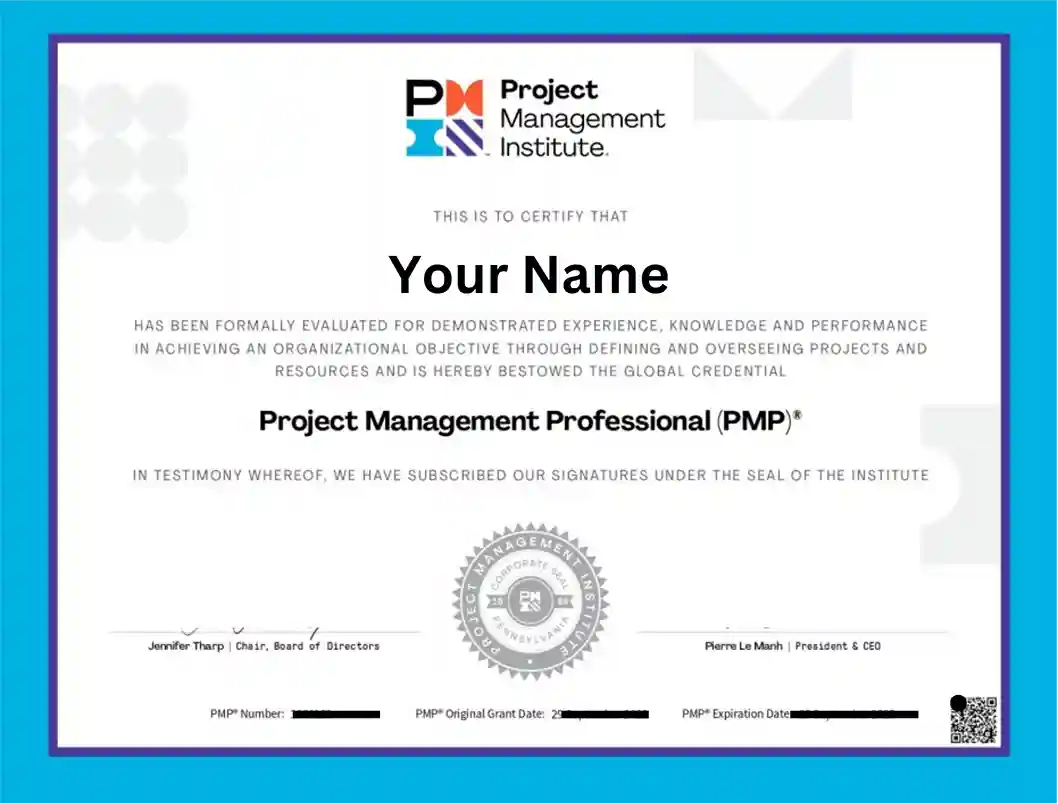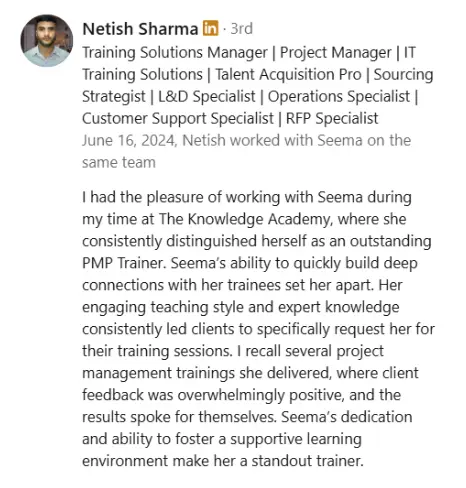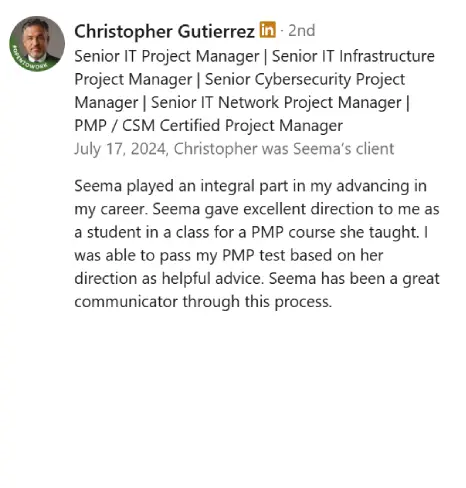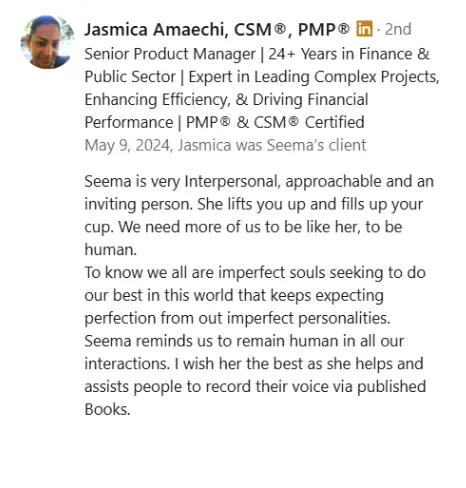Project Management Professional (PMP®) Certification Exam Prep Course
The ultimate PMP® Certification Training Course, fully aligned with the latest PMP Exam Content Outline
Transformative Learning with Global Expert
Access Session Recordings for 1-Year
Access to 5 Sets of MOCK Exam
Earn 35-Hour PMP Certificate of Participation
Expert Guidance for PMP Readiness (Resume Audit)
PMP ECO-Aligned Course Notes (PMBOK based)
Expert Guidance for PMP Application
Ongoing Support via Exclusive Forums
Transform Your Team with Expert Corporate Training : Get a quote
The Upbuild Advantage :
Experience, Expertise and Excellence
Years of Experience
Corporate Customers Served
Countries
Who Should Enroll
Mid-level Project Managers seeking advancement
Experienced Project Coordinators transitioning to managerial roles
Professionals aiming to formalize their project management skills with a certification
Team Leaders in Project-Based Environments seeking formal project management training
Project Management Consultants looking to bolster their credentials
Who Should Enroll
This certification is ideal if you are:
A recent graduate or student planning a project management career
A team member who supports projects but wants to step into leadership
A technical or business professional looking to understand structured project delivery
A career switcher moving into a project-related role from another field
An early-career professional who wants to enhance your resume with a globally recognized credential
Project Management Professional (PMP®) Certification Training Course
This course is designed for mid-level project managers with several years of experience. It validates the ability to manage complex projects and lead cross-functional teams effectively.
Eligibility Criteria
Four-years degree
36 months of leading projects
35 hours of project management education/training or CAPM® certification
OR
A high school diploma or an associate's degree (or the global equivalent)
60 months of leading projects
35 hrs of project management education/training or CAPM® certification
Course Outline
Lesson 1: Business Environment
- Overview of the five process groups in the Project Lifecycle.
- Definition and characteristics of Projects.
- Principles and Performance domains of Project Management.
- Introduction to Program and Portfolio Management.
- Business Case and Benefit Realization Plan.
- Project selection criteria, including ROI, NPV, and IRR.
- Overview of Life Cycle Models: Predictive, Iterative, and Agile.
- Introduction to Agile Mindset, Values, Principles, and Approaches.
- Project Governance and Organizational Influences.
- Understanding the Project Management Office (PMO) and its types.
- Exploration of Project Organizational Structures: Functional, Matrix, and Projectized.
- Insights into Enterprise Environmental Factors and Organizational Process Assets.
- Business Environment Quiz.
Lesson 2: Initiating a Project
- Crafting a Project Charter and fostering stakeholder understanding.
- Role and responsibilities of a Project Manager.
- Introduction to PMI Talent Triangle, Ethics, Professional Conduct, and Servant Leadership.
- Stakeholder importance, identification, analysis, and mapping.
- Stakeholder Register creation.
- Project Initiation Quiz.
Lesson 3: Planning the Project
- Integrating Plans: Developing a comprehensive Project Management Plan.
- Planning Scope: Delving into Scope Management, Requirement gathering, and Definition.
- Developing Schedule: Understanding Schedule Management, Activity Definition, Sequencing, Estimation, and Agile Scheduling Techniques.
- Planning Cost: Cost Management, Estimation Methods, Budgeting, and Baseline Management.
- Quality Planning: Quality Management Concepts, Planning, Metrics, and Improvement.
- Resource Planning: Resource Management Plan, Organizational Structures, RACI Charts, and Team Development.
- Communication Planning: Establishing Communication Requirements, Channels, and Management Plans.
- Project Risk Management: Comprehensive Risk Management, Identification, Assessment, Quantification, and Response Planning.
- Project Procurement Management: Procurement Planning, Contract Types, Selection Criteria, and Management.
- Project Stakeholder Management: Stakeholder Engagement Planning and Assessment.
Lesson 4: Executing the Project
- Team Development: Acquiring Resources, Kick-off Meetings, Team Development Stages, and Virtual Team Management.
- Agile Execution: Iterations, Scrum Ceremonies, Planning, Review, Retrospectives, and Daily Scrum Meetings.
- Stakeholder Engagement & Communication Management: Managing stakeholder relations and communications.
- Risk Management & Quality Assurance: Risk Identification, Quantitative and Qualitative Analysis, Quality Audits, and Continuous Improvement Practices.
- Procurement & Contract Management: Conducting Procurements, Source Selection, Bidder Conferences, and Contract Negotiations.
- Knowledge Management: Managing Project Knowledge, Lessons Learned, and Knowledge Management Best Practices.
Lesson 5: Monitoring Project Performance
- Comprehensive Monitoring Techniques, Corrective Actions, and Earned Value Analysis.
- Quality Control Tools, Communication Monitoring, and Agile Metrics.
- Risk Monitoring, Procurement Control, Stakeholder Engagement Monitoring, and Change Control.
Lesson 6: Closing the Project
- Project Closure Procedures, Reporting, Transition Planning, and Knowledge Transfer.
- Quiz on Project Quality Management.
PMP Study Club
- Participant introduction and expectations.
- Overview of PMI® and PMP® certification benefits.
- Detailed walkthrough of PMP® certification process, fees, and application procedures.
- Examination insights, including question patterns and preparation tips.
- Familiarization with course structure, protocols, and timelines.
- Expectation setting and clarification sessions.
- Introductory quiz to gauge participants’ familiarity with PMBOK® concepts.
What You Will Learn in PMP® Training
from UpBuild Academy
PMI’s Project Management Framework
Gain a deep understanding of PMBOK® Guide principles and global best practices.
Project Lifecycle & Methodologies
Process Groups & Knowledge Areas
Project Planning & Execution
Stakeholder & Communication Management
Exam Preparation & Certification Readiness
UpBuild’s Project Management Professional (PMP®) Certification Training Course
World-Renowned Instructors
Our instructors are top-tier professionals with PMP certifications and extensive experience at leading global firms. They bring a wealth of practical insights to help you navigate the complexities of modern project management.
Personalized Attention
With intentionally limited class sizes, our program ensures you receive personalized attention and guidance from instructors. This setting enhances your learning experience, allowing for detailed discussions and individual feedback.
PMP® Exam Prep Training: Industry-Recognized Certification
Earning a PMP® certification sets you apart in the job market. Our rigorous program covers essential project management principles, significantly boosting your changes of passing the PMP® exam and advancing your career.
Upcoming Virtual PMP® FasTrac
Live Virtual Class
PMP® FasTrac
April 21, 22, 23, 24
Live Virtual Class
PMP® FasTrac
May 10,11,17,18
Live Virtual Class
PMP® FasTrac
Live Virtual Class
PMP® FasTrac
Live Virtual Class
PMP® FasTrac
Live Virtual Class
PMP® FasTrac
Your Path to PMP® Exam Success

Earn the Coveted PMP Certification

Testimonials



Frequently Asked Questions
What is the PMP certification?
The PMP certification is a globally recognized credential for project managers, offered by the Project Management Institute (PMI). It demonstrates proficiency in project management principles, processes, and best practices.
Who is eligible to apply for the PMP exam?
To be eligible for the PMP exam, candidates must have either a four-year degree (bachelor’s or the global equivalent), 36 months leading projects, and 35 hours of project management education OR a secondary degree (high school diploma, associate’s degree, or the global equivalent), 60 months leading projects, and 35 contact hours of project management education.
What is the PMP exam format?
The PMP exam consists of 180 multiple-choice questions, which need to be completed within a time limit of 230 minutes. The questions are based on the PMI’s Project Management Body of Knowledge (PMBOK) Guide.
How should I prepare for the PMP exam?
Preparation for the PMP exam typically involves a combination of self-study using resources like the PMBOK Guide, practice exams, and other study materials, as well as formal training through PMP exam preparation courses.
What is the passing score for the PMP exam?
The passing score for the PMP exam is not pre-determined. PMI uses a psychometric analysis to determine a passing score based on the difficulty level of the questions.
How long is the PMP certification valid?
The PMP certification is valid for three years. To maintain certification, PMP holders must earn 60 Professional Development Units (PDUs) within each three-year certification cycle.
Can I renew my PMP certification after it expires?
Yes, PMP certification can be renewed by earning the required number of PDUs within the three-year certification cycle. If the certification expires, candidates must reapply and retake the exam.
What are the benefits of obtaining the PMP certification?
The PMP certification enhances career prospects by demonstrating expertise in project management, increases earning potential, and provides access to a global network of project management professionals.
Is the PMP certification recognized internationally?
Yes, the PMP certification is recognized globally as a standard for project management excellence. It is valued by employers across various industries and geographical regions.
Are there any prerequisites for maintaining PMP certification?
To maintain PMP certification, holders must earn 60 PDUs within each three-year certification cycle, which involves continuing education, professional development activities, and involvement in project management-related activities.
How much will PMI PMP Exam cost?
The cost of the PMP exam varies depending on whether you are a PMI member or non-member. PMI members typically receive a discount on exam fees. Check the PMI website for the most up-to-date pricing information.
What is the duration of the PMP exam?
The PMP exam duration is 230 minutes, during which candidates must complete 180 multiple-choice questions.
What is the recertification policy?
To maintain PMP certification, holders must earn 60 Professional Development Units (PDUs) within each three-year
How UpBuild Global help me get my PMP journey?
UpBuild Global can assist you in your PMP journey in several ways:
1. Training Courses: UpBuild Academy provides comprehensive Project Management Professional (PMP) Certification courses aligned with PMP exam preparation. These courses are meticulously designed to encompass all the topics and concepts essential for the exam. Led by seasoned instructors, they offer valuable guidance, tips, and strategies aimed at ensuring your success.
2. Study Materials: You get access to exclusive study material.
3. Exam Application Assistance: Applying for the PMP exam can be a complex process. UpBuild Academy can assist you with the exam application process, ensuring that you meet all eligibility requirements and submit a complete application to PMI.
4. Personalized Support: UpBuild Academy offers personalized support to help you throughout your PMP journey. Whether you have questions about specific exam topics, need additional resources, or require guidance on study strategies, UpBuild Global’s team is available to provide assistance and support.
5. Professional Development: In addition to preparing you for the PMP exam, UpBuild Academy can also help you develop the skills and knowledge needed to excel as a project manager. Through professional development opportunities, networking events, and mentoring programs, UpBuild Academy supports your ongoing growth and advancement in the field of project management.







